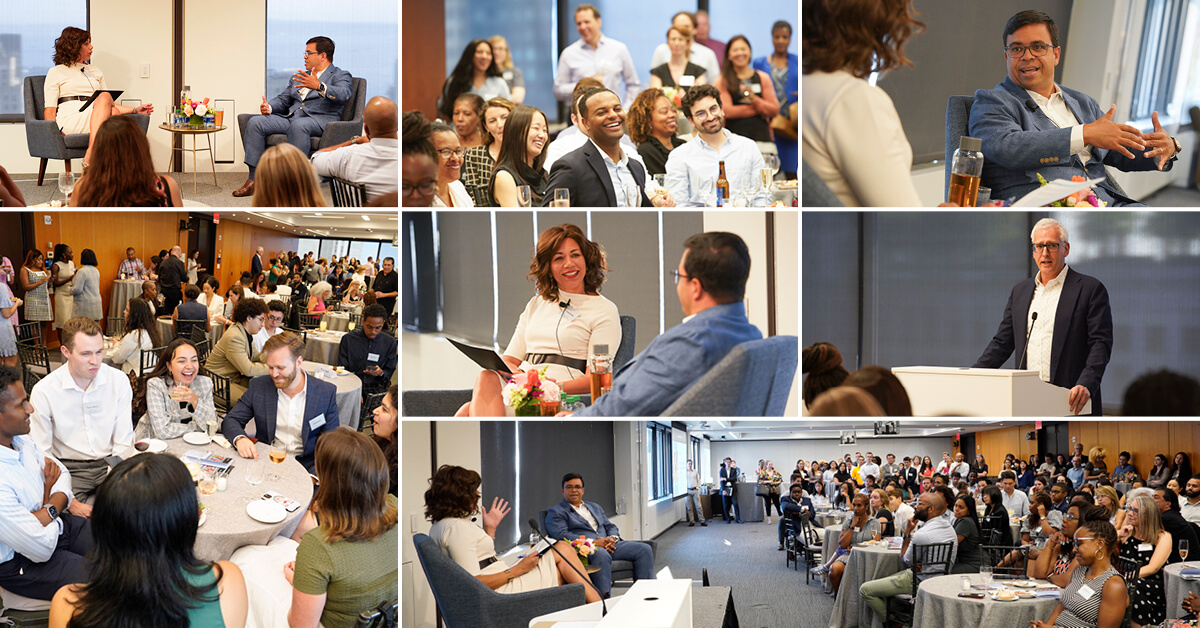Cleary Explores Impact of Landmark Affirmative Action Supreme Court Case at Citywide Diversity Reception
July 19, 2023

Cleary Gottlieb hosted its Annual Citywide Diversity Reception, “Advocating for Change, From Civil Rights to Affirmative Action,” featuring a fireside chat with Debo P. Adegbile, Partner, Chair of the Anti-Discrimination practice, and member of the Government and Regulatory Litigation group at WilmerHale; and former Commissioner on the U.S. Commission of Civil Rights (2017-2022).
Over 300 participants attended the event both in person and virtually, which included Cleary lawyers, professional services colleagues, clients, alumni, and friends of the firm. Managing Partner Michael Gerstenzang delivered welcome remarks, Partner Chantal Kordula moderated the discussion, and Global Director of Diversity, Equity, and Inclusion Laura Shepherd delivered closing remarks.
Michael also extended his congratulations to this year’s Legal Outreach interns completing their summer work. Cleary partners with Legal Outreach each year to prepare young people from underserved communities in New York City to compete at high academic levels.
Debo, a renowned legal expert in the intersection of public policy and education law who has dedicated his life and career to fighting for justice and equality, provided insights and discussed the highly debated and landmark SFFA v. Harvard case, which presents the complex issue of the consideration of race and ethnicity in college admissions processes. On June 29, 2023, the Supreme Court ruled that race-conscious admissions policies at Harvard and the University of North Carolina are unconstitutional.
A trusted advisor to colleges, universities, and higher education sports leagues, Debo, who has spent the last eight years as part of the team representing Harvard in the landmark Supreme Court case, shared his personal observations about the background of the case and discussed the decision, which broke with nearly 50 years of precedent on affirmative action in higher education that previously recognized that the educational benefits of college student diversity could justify limited race consciousness in admissions decisions.
Debo noted that one key part of the decision was Chief Justice Roberts’ acknowledgment that universities may continue to consider an applicant’s “discussion of how race affected his or her life, be it through discrimination, inspiration or otherwise.” He also shared his views on some of the potential strategies that have been proposed for achieving diverse college and university classes, such as focusing on socio-economic background, adopting percentage plans, and doing away with legacy and donor preferences. In his view, there are no easy solutions and colleges will explore a variety of options that may vary from school to school.
Chantal went beyond the topic of admissions and asked Debo how he expected the case to affect law firms, businesses, and other institutions as it relates to employment. While the decision has no immediate implications in the employment context and doesn’t immediately affect Title VII of the Civil Rights Act of 1964 that addresses employment or the ability of corporations to pursue diversity through lawful means, Debo noted that there may be new cases and other challenges to diversity programs, mentoring programs, and other efforts to diversify the leadership within corporations. Debo explained, however, that there is a fairly “well developed set of cases and jurisprudence” in Title VII that distinguish it from the legal precedents which permitted race consciousness in college admissions. He also noted that corporations could be more directly affected by the Court’s decision in the Harvard and UNC cases in terms of the diversity of their future hiring pools and in their recruiting efforts from leading colleges and universities.
Debo shared that his motivation to continue pursuing racial diversity and equality in light of the decision in the Harvard case is in the lessons he has taken from the history of civil rights and racial justice in America. “Progress is not unidirectional; we just don’t always march forward,” he said. “There are moments of progress and then there is some backsliding, and progress and racial justice have always been contested.” Debo stated that the work of being a civil rights lawyer and litigator is to narrow the gap between the high promises of equality we make and the way in which we deliver on those promises.
Cleary is committed to advancing diversity, equity, and inclusion. The firm regularly hosts important cultural events and guest speakers whose presentations afford opportunities to broaden awareness, heighten the level of discussion, and establish a culture of inclusion at the firm. To learn more about Cleary’s commitment to diversity, equity, and inclusion, click here.